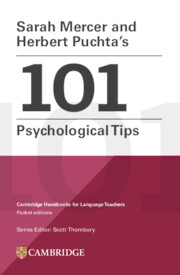Book contents
- Frontmatter
- Contents
- Acknowledgements
- Why We Wrote This Book
- A Psychological Tips for Teacher Wellbeing
- B Psychological Tips for Leading With Compassion, Authority and Skill
- C Psychological Tips for the Socio-Emotional Climate of the Group
- D Psychological Tips for Learner Engagement
- E Psychological Tips for Learner Self-Esteem
- F Psychological tips for Empowering Learners
- Index
E - Psychological Tips for Learner Self-Esteem
Published online by Cambridge University Press: 12 October 2023
- Frontmatter
- Contents
- Acknowledgements
- Why We Wrote This Book
- A Psychological Tips for Teacher Wellbeing
- B Psychological Tips for Leading With Compassion, Authority and Skill
- C Psychological Tips for the Socio-Emotional Climate of the Group
- D Psychological Tips for Learner Engagement
- E Psychological Tips for Learner Self-Esteem
- F Psychological tips for Empowering Learners
- Index
Summary
Self-esteem is how learners see themselves and how they feel about themselves. Their self-image is affected not only by what happens in school but by their experiences in all aspects of their lives. However, if teachers can strengthen and enhance their learners’ self-esteem in the language classroom, there is potential for that to have positive spillover into other areas of their lives too.
74 Communicate high expectations of all learners
75 Ensure learners can work with their strengths
76 Let the learner be the expert
77 Use peer feedback for precise, constructive, positive feedback
78 Get learners to embrace mistakes
79 Establish ways for learners to feel useful in class
80 Show your empathy
81 Work with near-peer role models
82 Contact parents with good news and praise
83 Encourage students to engage in gratitude practices
84 Learn to read the signs of low self-esteem
85 Use competition with care
74 Communicate high expectations of all learners
Holding high, positive expectations of learners empowers them with potential.
Teacher expectancy effects refer to the kind of beliefs teachers have about learners and how they can be communicated consciously and unconsciously so that they ultimately impact on learner behaviour and achievement. This theory was made famous by the ‘Pygmalion in the Classroom Study’ (Rosenthal & Jacobson, 1968), which suggested that when teachers’ expectations were manipulated to have either high or low expectations of learners, this affected how teachers interacted with learners, and thus how learners scored on IQ tests.
Research suggests that when we have high academic expectations of learners, we provide more opportunities to learn, more detailed, constructive feedback, more challenge to stretch, and we engage more with such learners (Weinstein, 2002).
It is important to communicate high expectations for all our learners. A first step can be to consciously reflect on each learner in your class and how you treat them, even keeping a journal to raise your awareness:
• Ensure all learners are given the chance to share their ideas and express their voice. Keep a checklist of who you have engaged with.
• All learners need constructive, detailed feedback and encouragement which conveys your belief in their potential to improve.
• Work with learners explicitly on growth mindsets. This helps them to see you believe in the ability of all learners to improve.
• Monitor whether all learners are praised and disciplined with the same high expectations.
- Type
- Chapter
- Information
- Sarah Mercer and Herbert Puchta's 101 Psychological Tips , pp. 78 - 90Publisher: Cambridge University PressPrint publication year: 2023



